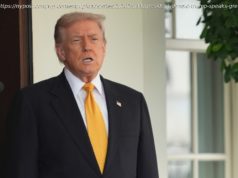Park seconded a U. N. official’s call for the Kim regime to issue a general amnesty for political prisoners during or soon after the summit.…
Park seconded a U. N. official’s call for the Kim regime to issue a general amnesty for political prisoners during or soon after the summit.
U. N. Special Rapporteur on Human Rights for North Korea Tomas Ojea Quintana said last week that a “human rights dialogue” must be included in the discussion between Trump and Kim in order for “this new process to be successful.”
To that end, Quintana called on the North Korean government to issue “a general amnesty to release hundreds of prisoners who are under detention” as a sign of its “willingness to commit to U. N. human rights principles.”
“What I am saying is that at some point, whether the next summit or other summits to come or meetings, it is very important that human rights are raised. Otherwise, first it will be a problem in terms of building a sustainable agreement with DPRK with regard to denuclearization,” he said.
Quintana argued that far from impeding denuclearization talks, human rights concerns must be addressed by North Korea to “show that they want to become a normal state” if Kim is to be given any credibility at the negotiating table.
Robert Park is a Christian missionary from Tucson who was arrested in Pyongyang in 2009 when he tried to call attention to the regime’s human rights abuses. He was held for 43 days, during which he said he was drugged, tortured, and sexually abused.
In his own call for amnesty, he cited U. N. reports on the hideous conditions in North Korea’s labor camps, where up to 120,000 people have been imprisoned and brutalized without anything the civilized world would recognize as due process.
Park explained how North Korea’s prison camps operate in defiance of international legal and humanitarian standards:
Park quoted observers who have compared the kwanliso to the unspeakable atrocities of the Khmer Rouge in Cambodia and Nazi concentration camps. One of the observers who made that comparison is Thomas Buergenthal, himself a survivor of Auschwitz. Buergenthal thought North Korea’s camps could even be worse than the horrors he experienced at the hands of the Nazis.
“As the Korean war appears to finally be over and peace proclaimed, no possible pretext exists for the detention of those inside the kwanliso. So any peace accord with Kim must guarantee the complete, verifiable and irreversible release of all prisoners of conscience, political and religious prisoners together with their families,” Park declared.
The Trump administration has sent conflicting signals about the role human rights could play in the negotiating process, possibly at subsequent meetings if the topic is not broached during the Singapore summit. President Trump himself explicitly stated that he would discuss humanitarian issues with Kim just a few days ago.
On the other hand, NBC News claimed on Monday that it was told by “two administration officials” that the United States has “decided not to bring up human rights at the summit.” The report is even vaguer than the usual anonymously-sourced journalism because NBC later mentions talking with two former Obama administration officials, without making it clear whether they are the source for the contention that the issue will not be broached at all.
The Obama officials thought it was “appropriate” to leave humanitarian demands out of the first meeting between Trump and Kim, but urged Trump to “seek human rights concessions after a nuclear deal is consummated.”
Sen. Orrin Hatch (R-UT) wrote in a Fox News op-ed on Sunday arguing President Trump should immediately demand North Korea “cease its human rights abuses” in addition to ending its quest for nuclear missile technology.
Hatch made the same point as U. N. rapporteur Ojea Quintana that North Korea cannot be taken seriously about denuclearization if it continues to abuse its people in such a barbaric fashion, adding that it would be abhorrent to normalize relations with Pyongyang if the prison camps and slave-labor operations remain open:
Human Rights Watch argues the 2016 North Korea Sanctions and Policy Enhancement Act legally requires President Trump to maintain sanctions against Pyongyang unless humanitarian reforms are enacted, expressly including improvements to the prison system.
The argument for keeping these issues in the background, at least initially, is cold but logical: Kim’s primary concern is the security of his regime, and that security would be severely threatened by conceding his government has perpetrated atrocities on par with Nazi Germany and releasing hundreds – or, if the Western world is really serious about ending these horrors, tens of thousands – of dissidents.
Normalization without civilization would be abhorrent, as Hatch contends. Denuclearization without normalization may be impossible. Arms control promises without a commitment to a more civilized government are difficult to take seriously. Slow liberalization as a result of cultural and economic engagement would take years – and frankly, the track record for liberalization through engagement in other authoritarian regimes is not encouraging, especially when those regimes are prepared to engage in North Korean levels of brutality to maintain power.
Regional security concerns and the global machinations of third parties like China and Russia must be prioritized, but the people of North Korea cannot be abandoned in the urgent drive to reach a security agreement with their monstrous rulers. The moral and strategic puzzle President Trump must begin to solve in Singapore is one of the most complex, perilous, and horrifying challenges American diplomacy has ever faced.






